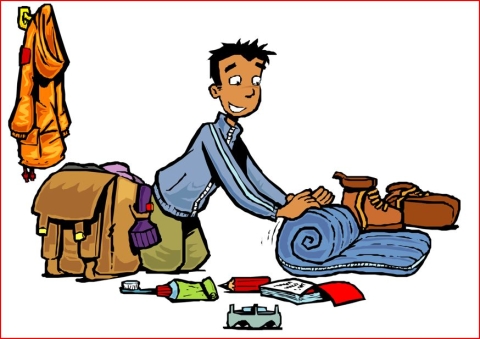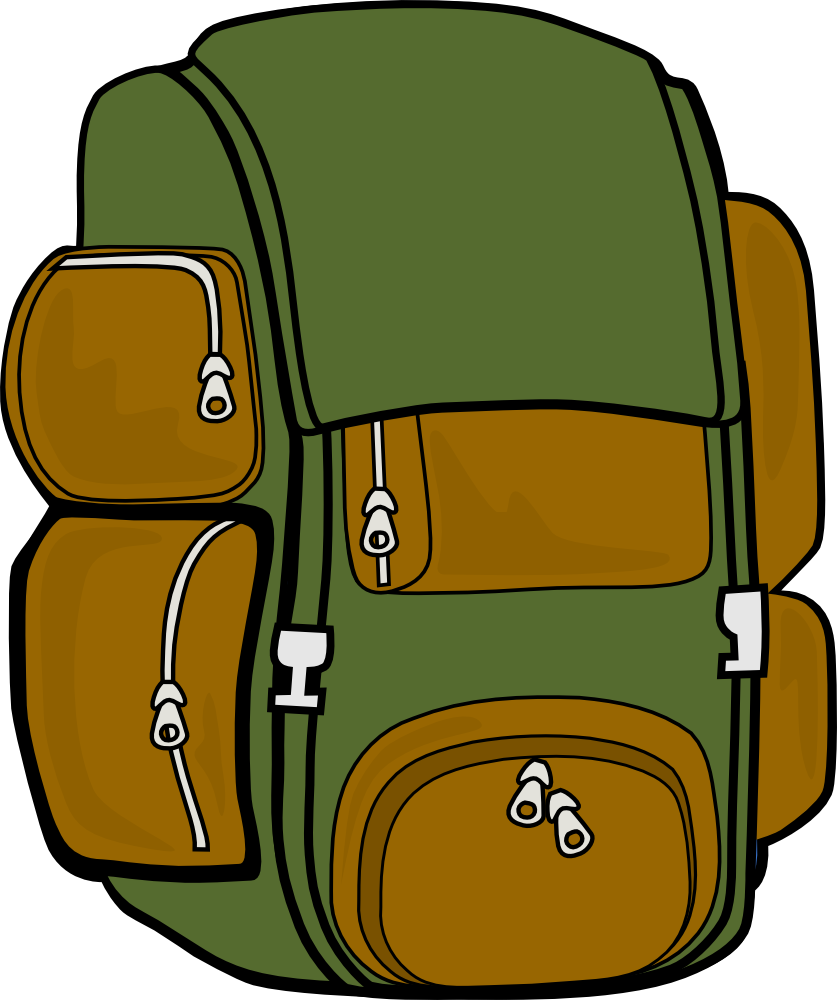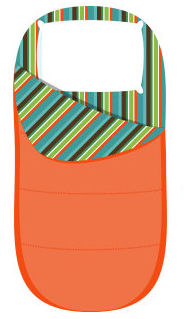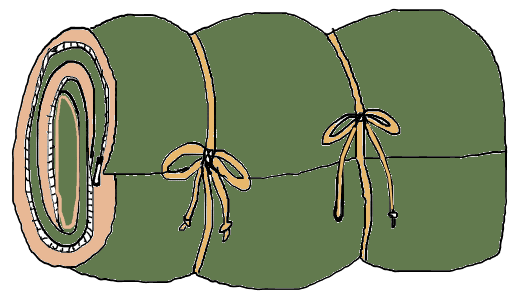The key to successful packing for Summer Camp is to plan ahead and to begin early!

Things to remember while packing for camp
Packing for camp can border on being an art form. Unlike sending your child for a sleepover at a friend's house, a stay at camp can last anywhere from a week to an entire summer! So, before you zip up that knapsack and send your child off to to Summer Camp without enough underwear, check out our tips for smart and successful packing.
Before you begin, check with your child's camp packing list provided by the organization. There may be special items, like bedding, that you'll need to include in your child's gear.
Next, remember to wash all new clothing before packing and mark everything your child will be taking, from socks to soap cases, with their name or initials.
Now, armed with an empty truck or duffel, calculate how much clothing your child will need. Your camp offers the best advice. If a packing list is provided by the camp, carefully follow it. Whether you’re filling a daypack for day camp or a duffle, backpack, or trunk for overnight camp, remember that more is not necessarily better. Over-packing is the most common camp prep error families make. Over-packing creates difficulty in finding essential items quickly — the swimsuit for free swim, for instance. Over-packing increases the chances that possessions will get lost somewhere in camp. Over-packing burdens the camper. Pack enough, but not too much... My son came home after a week at camp with at least half of his clothes still untouched. When asked why, he replied, "Dad, I was too busy at camp to change my clothes!"
Give yourself plenty of time to help your youngster pack for camp. Pack together with your child, not for them. If campers are to manage their belongings while at camp (for the day or for weeks at a time), they need to help pack them. Camp experiences teach children valuable life lessons in how to keep track of and to take care of their belongings. If adults do the packing for and not with campers, children don’t know what they have or where to find it.
10 Tips on packing for summer camp
- Bag to hold everything. Let's start with the basics--the pack. Big duffel bags work best. They should be big enough to have some extra space after everything is inside. We all know dirty, balled up clothes take more room than clean folded ones! Within the duffel bag you can invent you own ways to organize things. Large zip lock bags work well for things like underwear, socks and toiletries. Extra pillow cases could hold shorts and T-shirts. Be creative! Remember, this is to make things easier for your child once they arrive at camp.
- A flashlight. For a flashlight, just send one that is small and inexpensive. Anyway, counselors try to keep flashlights in the camper's bag. Campfires are not much fun when you repeatedly hear, "If you turn that flashlight on one more time, I'm taking it away." It's all part of the camp experience to be outdoors at night in the dark. Children are often times amazed when they turn their flashlights off and find that they can actually see that the moon casts wonderful shadows on everything!
- Clothing. Every camp clothing list is pretty much the same: shorts, T-shirts, underwear,socks, and a light jacket. That's the easy part. Just don't rule out some important considerations that we might not think of, like an extra swim suit. Many camp's activities are centered around swimming or water. If that swim suit gets lost, as they sometimes do, you child will be in hot water instead of a nice cool pool or lake. When a packing list says 12 pairs of socks, expect to find about four in your child's bag when he or she comes home; and none will be pairs. For any normal summer camp, cheap white socks should work fine. A sock's life at camp starts by getting worn, then getting dirty, sometimes getting wet, and finally getting lost. Our sons were pretty good at bringing home almost all of their socks this summer, all ofwhich we promptly threw away because it was doubtful we could ever get them clean!
- Don't forget. Toiletries are often overlooked or forgotten. The camp that two of our sons were at this past summer made everyone shower every night. That means an ample supply of shampoo and soap, possibly conditioner. Send enough toiletries for them to realistically make it through their stint at camp. Obviously, a longer stay at camp requires more stuff. Don't forget the toothbrush and toothpaste! Put all of this into a zip lock bag or zippered bag, it's the easiest way for the camper to bring it to and from the bathroom at night. Don't throw in other things that the camper really doesn't need. Other items will only get lost, or at the least, will make it difficult for your child to find what they are really looking for; keep it simple! Scissors, tweezers, first aid supplies, etc. should all stay out of this bag.
- Medication and first aid. If your child needs medication, be sure to give it to the camp nurse with instructions on when it is to be given. Inhalers also go to the nurse. Don't send any medication in the child's bag, even if it is over-the-counter. If you want to make sure your child gets a particular over-the-counter medication, send it to the nurse. She'll put your name on it and can administer it to your child if and when necessary. It's probably not a good idea to send a first aid kit with your child. Camps want to be responsible for properly treating and documenting any injuries. Counselors carry first aid kits and are also never bothered by taking kids to the nurse's office. Campers are there to have fun, not to doctor themselves.
- No high tech. Your kids are also not there to play video games. Toys, iPods, smart phones and the like, should stay at home. If your child comes back from a week at summer camp and they tell you they got the high score on their video game, you just wasted your money. Summer camp is a place where children get away from their regular lives and try something different. You don't send them off to sit around inside. Besides, the electronics and other banned items are typically taken from from campers and held until the end of the session.
- Cell/Smart phones. Cell phones aren't allowed for another reason. Calling home promotes homesickness. When a child misses home, the last thing he or she should do is call and think more about it. At camp we don't talk about home. We don't ask about it and we don't tell about it. It's all about camp, all day long, and even into the night!
- Sleeping bags. Please get your child a sleeping bag that fits them at the age they are when camp begins. No sleeping bags that can fit a 6-foot, 200-pound man, when your child is 4 feet tall. Make sure youb take your child along when you buy it so that they end up getting something that you both know is going to be comfortable. There is too much activity going on during the day to be loosing sleep at night.
- Water bottle. Every camper needs a water bottle. Pull top or sport bottles are the best bet for price and usefulness. Get your kids used to the idea of drinking water before coming to camp. You will be happy you did!
- Mark everthing. Affix your child's name to everything! Every sock, each pair of underwear, the pencils and the flashlight batteries. If you do, chances are some of your child's possessions will make it back home. Mark important things like towels, swimsuits, and shoes that always seem to walk off by themselves. As long as you have done your part, the counselors can take care of the rest.
Camp packing list
Here are the things you and your son or daughter will need to pack for a typical summer camp:
- Bandanna/scarf
- Hat
- Glasses/contacts and cleaning solution
- Prescription medication
- Sunglasses
- Goggles for swimming
- Dress clothes and coordinating belts and shoes
- Light jacket
- Jeans
- Raingear or umbrella
- Shorts
- Sweatshirt
- Swimsuit
- Swim shirt with UV protection
- T-shirts
- Tank tops
- Underwear
- Sweat pants or warm up pants
- Pajamas
- Cotton bathrobe
- Bras
- Athletic support (jock strap)
- Boots
- Cleats
- Flip flops
- Shoes plus a spare pair
- Socks
- Bedding -- check with your camp checklist for what, if any, to bring for bedding
- Hand towels
- Beach towels -- can be used for bath or swimming
- Shower caddy
- Comb or brush
- Deodorant
- Feminine hygiene products
- Bug repellant
- Lip balm
- Nail clippers
- Shampoo and conditioner
- Shaving cream and razors
- Soap in carrier
- Sunblock
- Tissues
- Toothbrush, toothbrush container, and toothpaste
- Camera
- Flashlight and spare batteries
- Laundry bag
- Reusable water bottle or canteen
- Writing paper, pre-addressed envelopes, and stamps or calling card
- Spending money (but check with camp for policies)
- Comforts of home, like a family photo or a stuffed animal; just be sure it is replaceable
- Entertainment, like books, hackey sacks, and deck of cards
- Small backpack or tote for day-trips
Other packing recommendations
Make a list of the following items to help your camper feel comfortable during his or her stay:
- Plastic bags to hold laundry or wet items will come in very handy, as well as zip-locks to keep small items together. Many camps ask you to buy the camp logo laundry bags to facilitate laundering.
- Pack enough sun care protection (hat, sunglasses, and sun block, lip balm with SPF, as well as insect repellant). An extra pair of prescription glasses may be a good idea too!
- Prepare a bathroom kit with toiletries and shower shoes.
- Send any required medications separately to the infirmary.
- Schedule a pre-camp call with a camp nurse to review any medical requirements, including food allergies.
Packing shortcuts
More packing shortcuts and space savers:
- Put paired/rolled socks and undergarments in washing bags with holes, which also keeps them neatly stored in a loose cubby shelf.
- Pack folded and rolled shirts and pajamas in clear zip-loc bags. Label the bag with contents and quantity.
- Stuff breakable items (e.g. tennis racquet) in thick, cushioned items (e.g. comforter) as space and protection savers.
Home away from home
These tips will help your child feel at home and will help ease any homesickness they may feel while at overnight camp:
- Include books, small games and a flashlight for cabin time and pre-addressed stationery with stamps to write letters home.
- Do include a favorite comforting item your smaller child can turn to in times of emotion that helps him/her feel secure (e.g. stuffed animal or blanket).
- Check the policy on the permitted use of cell phones and electronics, and any special gear or musical instruments. Avoid sending any valuable permitted ones.
Final steps
Once everything is gathered, begin to label every item and take inventory of everything that is going to camp, to help adjust packing for the following year. Then start packing as soon as possible. Don't over pack! It will make it difficult to lift the trunk or duffle and cause rips.
Finally, put a copy of the inventory list in the camp trunk. It will serve as a reminder to your child of what was sent, and help him/her develop responsibility for his/her belongings. You can also email one to the camp for repacking to ensure most of what you packed returns home!
You will feel empowered when your camper is packed up. Remember to take a photo of him/her sitting on the luggage! It marks the beginning of the camp season for them – and you!
Remember...
Camp provides an opportunity for each child to benefit as an individual and as a member of a group, from time spent in a world designed exclusively for children. It also offers parents and children a chance to practice normal, healthy separation, for the day or for several days or weeks at a time. At camp, children develop autonomy and a stronger sense of self. They make new friends, build skills, and experience teamwork. And at the end of camp, parents report their children’s increased sense of independence.
Campers love to reminisce. So set your child up for success by planning for what will happen with photos and camp memorabilia. Will there be a photo album? A special box for collecting camp memories? Get the rest of the family ready to hear camp stories and songs. Those can go on well into the winter and spring, until it’s time, once again, to return to camp.


